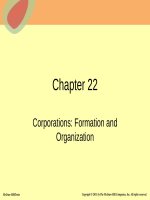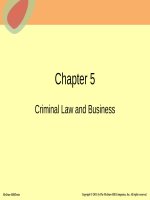- Trang chủ >>
- Thạc sĩ - Cao học >>
- Luật
Lecture Dynamic business law, the essentials (2/e) - Chapter 5: Criminal law and business
Bạn đang xem bản rút gọn của tài liệu. Xem và tải ngay bản đầy đủ của tài liệu tại đây (242.07 KB, 27 trang )
Chapter 5
Criminal Law and Business
McGrawHill/Irwin
Copyright © 2013 by The McGrawHill Companies, Inc. All rights reserved.
Elements of a Crime
• “Actus Reus”—Wrongful behavior
(guilty act)
• “Mens Rea”—Wrongful state of mind,
such as purpose, knowledge,
recklessness, or negligence (guilty
mind)
52
Classification of Crimes
• Felonies—Serious crimes punishable by
imprisonment for greater than one year, or
death
• Misdemeanors—Less serious crimes
punishable by fines, or imprisonment for
less than one year
• Petty Offenses—Minor misdemeanors
punishable by small fines or short jail
sentences
53
White Collar Crime
Definition: A variety of nonviolent
illegal acts against society that
occur most frequently in the
business context
54
Crimes Affecting Business: “White
Collar” Crimes
• Bribery
• Extortion
• Fraud
• Embezzlement
• Computer Crimes
55
Bribery
Definition: The offering, giving,
soliciting, or receiving of money or any
object of value for the purpose of
influencing the judgment or conduct of
a person in a position of trust
56
Extortion (Blackmail)
Definition: The making of threats
for the purpose of obtaining
money or property
57
Fraud
Definition: A variety of means by
which an individual intentionally
uses some sort of misrepresentation
to gain advantage over another
person
58
Elements of Fraud
• A material false representation
made with intent to deceive;
• A victim’s reasonable reliance on
the false representation; and
• Damages
59
Exhibit 5-1: Selected Types of
Fraudulent Crimes
•
•
•
•
•
•
Forgery
Defalcation
False Entries
False Token
False Pretenses
Fraudulent
Concealment
•
•
•
•
•
•
Mail Fraud
Health Care Fraud
Telemarketing Fraud
“Ponzi Schemes”
Check “Kiting”
“Pretexting”
510
Embezzlement
Definition: The wrongful conversion of
another’s property by one who is
lawfully in possession of that property
511
Computer Crime
Definition: Any wrongful act that is
directed against computers, uses
computers to commit a crime, or
involves computers
512
Criminal Procedure
513
Differences Between Criminal and Civil
Procedure
Criminal Procedure
•
•
•
The government, through a
prosecutor, always brings the
criminal case
The objective is punishment, in
the form of a criminal fine
and/or imprisonment
Numerous constitutional
safeguards for the criminal
defendant
Civil Procedure
•
•
The party filing the case, the
plaintiff, can be an individual,
business, or government entity
The objective is to remedy a
wrong done to the plaintiff, so
the defendant will either have
to pay money damages, or be
subject to an equitable remedy
(injunction or specific
performance)
514
Constitutional Safeguards: The
Fourth Amendment
• Protection from “unreasonable
search and seizure”
• Restrictions on warrants
515
Constitutional Safeguards: The
Fifth Amendment
• Prohibition of “double jeopardy”
• Right not to incriminate oneself
• Right to “due process”
516
Constitutional Safeguards: The Sixth
Amendment
• Right to a speedy and public trial
• Right to a trial by an impartial jury of one’s peers
• Right to be informed of the accusations against oneself
• Right to confront witnesses
• Right to have witnesses on one’s side
• Right to counsel at various stages of the proceedings
517
Constitutional Safeguards: The Eighth
Amendment
• Freedom from excessive bail
• Freedom from excessive fines
• Freedom from cruel and unusual punishment
518
Constitutional Safeguards: The
Fourteenth Amendment
• Extension of the right to due process
to all state matters
• Extension of most constitutional
rights to defendants at the state level
519
Criminal Procedure: Pretrial Procedure
• Arrest
• Booking
• First Appearance
• Indictment
• Arraignment
520
“Miranda Rights”--Before a law enforcement officer engages
in “custodial interrogation,” he/she must inform the defendant
of the following:
• “You have the right to remain silent and refuse to answer
any questions”
• “Anything you say may be used against you in a court of
law”
• “You have the right to consult an attorney before speaking
to the police and have an attorney present during any
questioning now or in the future”
• “If you cannot afford an attorney, one will be appointed for
you before the questioning begins”
• “If you do not have an attorney available, you have the
right to remain silent until you have had an opportunity to
consult with one”
• “Now that I have advised you of your rights, are you willing
to answer any questions without an attorney present?”
521
Criminal Procedure: Trial Procedure
• Jury Selection
• Trial (with burden of proof on prosecution)
• Jury Deliberations
• Jury Verdict
• Sentencing Hearing (if Defendant found
guilty)
522
Defenses to Crimes
• Infancy
• Mistake
• Intoxication
• Insanity
• Entrapment
• Necessity
• Justifiable Use of
Force
• Duress
523
Criminal Procedure: Posttrial
Procedure
• If jury returns verdict of not guilty,
government (prosecution) cannot appeal
the acquittal
• If jury returns verdict of guilty, defendant
may appeal verdict by claiming prejudicial
error of law at trial
• If no appeal, defendant sentenced after
judge receives additional information
relevant to sentencing
524
The Racketeer Influenced and
Corrupt Organizations Act (RICO)
• Prohibits persons employed by or associated
with an enterprise from engaging in a pattern
of racketeering activity
• Anyone whose business or property has been
damaged can sue to recover treble damages
and attorney fees in a civil action
525









